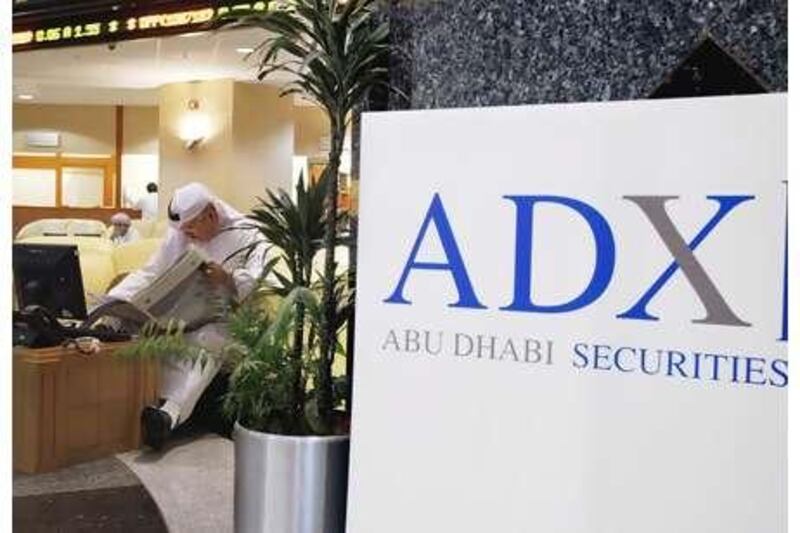DUBAI // The equity markets are entering an extended summer and Ramadan period, and the only catalyst that could bring investors out of hibernation are second-quarter corporate earnings. But pinning hopes on a sustained rally in the next few weeks in oversold UAE markets is a bit too optimistic. Analysts do not expect stellar performances from banking and property-sector firms, the two most dominant components of the UAE securities markets. At best, the market should expect short, stock-specific rallies fuelled by limited institutional participation.
"Between now and the end of this month, when second-quarter results start trickling in, we should see some stock specific rallies," said Yazan Abdeen, a fund manager at ING Investment Management in Dubai. "We should see some institutional participation but the chances of a sustained rally are minimal." Saud Masud, the head of research at the Swiss bank UBS, agreed: "We know the results are not that good and for a sustained rally you need change in market fundamentals."
All three UAE markets ended last week with significant aggregate losses. NASDAQ Dubai was the biggest loser among the regional peers, dropping 6.9 per cent as shares of Dubai World took a hammering, ending the last week 12.9 per cent lower, after the conglomerate announced it would delay its planned listing on the London Stock Exchange. The Dubai Financial Market (DFM) General Index was the second biggest loserin the region, ending down 4.5 per cent. Sharp losses in Deyaar Development and Emaar Properties last week weighed on the index.
The DFM declined for four sessions in a row and recovered marginally after the developer Nakheel announced it had started paying its trade creditors. "It is back to square one if you look at the where the markets were a few weeks back," Mr Masud said. There was minimal institutional investment in the UAE bourses last week, but the "aggressive capitulation of retail investment" was more worrying for analysts, he said.
Headline-driven retail investors account for more than 80 per cent of liquidity in UAE markets, and analysts say talk of a double-dip recession, growth concerns in Asian and European economies and crude prices dropping to 1960s levels are further eroding investor confidence. "Markets here are at a critical point," Mr Masud said. "We are heading to December lows and the international backdrop is not encouraging. We expect more volatility in coming weeks."
In the capital, the Abu Dhabi Securities Exchange (ADX) General Index dropped 1.7 per cent for the week, with the government-controlled investment firm Aabar Investments shedding 15.3 per cent after it announced plans to delist from the ADX. The rest of the GCC markets were not immune to selling pressure, and all of them closed down last week. "All eyes are on the second-quarter results, but before that happens, international markets and oil prices will be influential," Mr Abdeen said.
The Saudi Tadawul All-Share Index, the largest-cap index in the GCC, retreated 3.9 per cent last week, giving up its gains for the year so far. It ended yesterday's trading down 0.9 per cent at 6,033.91. All regional markets are now in negative territory, with the DFM and the ADX being the two biggest losers this year, down 18 and 9 per cent, respectively. Mr Abdeen said it would be interesting to see whether Saudi Arabian retail and services companies could maintain the profit margins from earlier periods, which could be a driver for trade in coming weeks.
The Kuwaiti and Bahraini indexes closed last week down 2.9 and 2.2 per cent, respectively, while shares in Doha closed down 3.3 per cent.The MSCI Arabian Markets Index ended the week down 4 per cent, while Abu Dhabi Islamic Bank's UAE Islamic index declined 3.9 per cent. Crude finished last week at US$71.70 a barrel, down 6.3 per cent as commodities dropped on the fears of a double-dip recession and on weak data from the US and China, the world's top two oil consumers.
Global equity markets also retreated last week, while the dollar slipped against the euro. US government data showed the jobless rate unexpectedly edged down to 9.5 per cent last month from 9.7 per cent in May. But non-farm payrolls fell by a surprising 125,000 last month, as 225,000 government workers who were hired for this year's census in recent months lost their temporary jobs and only 83,000 private-sector jobs were added.
@Email:skhan@thenational.ae







